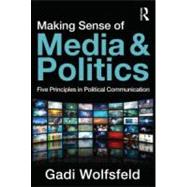
What is included with this book?
| Acknowledgements | p. ix |
| Introduction | p. 1 |
| Political Actors Compete Over the News Media | p. 7 |
| Political Power and Power Over the Media | p. 9 |
| Political Control and Media Independence | p. 23 |
| Turning Politics Into News | p. 45 |
| No Such Thing as Objective News | p. 47 |
| Telling a Good Story | p. 72 |
| Media Effects | p. 95 |
| The Media Get You When You're Not Paying Attention | p. 97 |
| A Postscript | p. 119 |
| Notes | p. 123 |
| References | p. 135 |
| Index | p. 145 |
| Table of Contents provided by Ingram. All Rights Reserved. |
The New copy of this book will include any supplemental materials advertised. Please check the title of the book to determine if it should include any access cards, study guides, lab manuals, CDs, etc.
The Used, Rental and eBook copies of this book are not guaranteed to include any supplemental materials. Typically, only the book itself is included. This is true even if the title states it includes any access cards, study guides, lab manuals, CDs, etc.